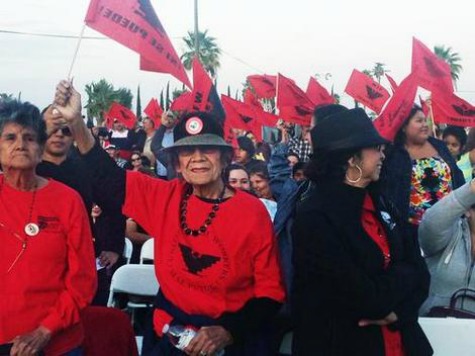On Sunday, a day before Cesar Chavez Day, the United Farm Workers (UFW) union distorted the late labor leader’s legacy during a San Francisco screening of a new movie about him. The union said Chavez would say, “Si se puede!” (“Yes, we can!”) to amnesty legislation, which he fervently opposed.
Chavez co-founded the UFW, and the producers of the Cesar Chavez movie, who have not shied away from liberal political causes in the past, avoided the topic of immigration reform in the movie because the facts were so against Chavez’s support of it. As The New York Times noted, the producers believed that Chavez “fought for better wages and conditions for workers but held complex and evolving views on the status of unauthorized immigrants, some of which would be at odds with the changes many Hispanics and others are seeking today.”
Ana Rosa, a United Farm Workers union negotiator, said on an immigration panel before a San Francisco screening of the movie with FWD.us, the pro-amnesty group started by Facebook co-founder Mark Zuckerberg, that Chavez would have been all-in on amnesty legislation.
Arturo Rodriguez, the current president of the UFW, said this was a “historic moment.” The tech industry wants an influx of foreign workers with more high-tech visas because they claim there is a shortage of high tech workers even though there is no empirical evidence to support those claims.
Partnering with the tech industry to pass comprehensive immigration reform would lower wages for American workers, as the Congressional Budget Office determined, which is against everything Chavez stood for.
As Breitbart News has previously noted, Ruben Navarrette, Jr., a supporter of comprehensive immigration who has “studied and written about Chavez and the United Farm Workers … for more than 20 years,” wrote in a 2010 essay that “the historical record shows that Chavez was a fierce opponent of illegal immigration.” He added that “it’s unlikely that he’d have looked favorably on a plan to legalize millions of illegal immigrants.”
Chavez also wanted stiffer sanctions against employers who hired illegal immigrants, and Navarrette emphasized that it was “absurd for anyone to invoke the name of Cesar Chavez to pass immigration reform.” He stressed, “As I said, were he alive today, it’s a safe bet that Chavez would be an opponent of any legislation that gave illegal immigrants even a chance at legal status.”
Navarrette wrote that, according to numerous historical accounts, “Chavez ordered union members to call the Immigration and Naturalization Service and report illegal immigrants who were working in the fields so that they could be deported.”
He noted that while Chavez was with the UFW, “UFW officials were also known to picket INS offices to demand a crackdown on illegal immigrants,” and the UFW even “set up what union officials called a ‘wet line’ to stop Mexican immigrants from entering the United States. Under the supervision of Chavez’s cousin, Manuel, UFW members tried at first to convince immigrants not to cross the border”:
When that didn’t work, they physically attacked the immigrants. Covering the incident at the time, the Village Voice said that the UFW was engaged in a “campaign of random terror against anyone hapless enough to fall into its net.” A couple of decades later, in their book The Fight in the Fields, Susan Ferris and Ricardo Sandoval recalled the border violence and wrote that the issue of how to handle illegal immigration was “particularly vexing” for Chavez.
Chavez was also against ethnic groups like La Raza. In fact, he saw the dangers of such organizations from the beginning.
“I hear more and more Mexicans talking about la raza–to build up their pride, you know,” Chavez told Peter Matthiessen, the co-founder of the Paris Review, for a profile piece in The New Yorker in 1969. “Some people don’t look at it as racism, but when you say ‘la raza,’ you are saying an anti-gringo thing, and it won’t stop there.”
Chavez continued in the interview:
Today it’s anti-gringo, tomorrow it will be anti-Negro, and the day after it will be anti-Filipino, anti-Puerto Rican. And then it will be anti-poor-Mexican, and anti-darker-skinned Mexican. We had a stupid guy who just wanted to play politics with the union, and he began to whip up la raza against the white volunteers, and even had some of the farm workers and the pickets and the organizers hung up on la raza. So I took him on. These things have to be met head on.

COMMENTS
Please let us know if you're having issues with commenting.